MGT201: Cross-Cultural Report - Romania vs. Brunei Management Styles
VerifiedAdded on 2022/12/15
|7
|1544
|262
Report
AI Summary
This report provides a comparative analysis of the cultures of Romania and Brunei, focusing on cross-cultural management principles. It examines how team management is approached in each country, including motivational factors and leadership styles, highlighting the differences in the Romanian focus on empowering employees and the Bruneian emphasis on hierarchy. The report delves into the value systems, traditions, and beliefs of each nation, noting the Romanian Orthodox Christian majority and the strong influence of Islam and Malay culture in Brunei. It then explores negotiation styles, emphasizing the importance of detail and professionalism in Romania and the long-term, consensus-driven approach in Brunei. Finally, the report considers the impact of historical and socio-political events on cross-cultural relationships, such as the investment challenges in Romania and the political developments in Brunei, offering a comprehensive overview of cultural influences in a business context.
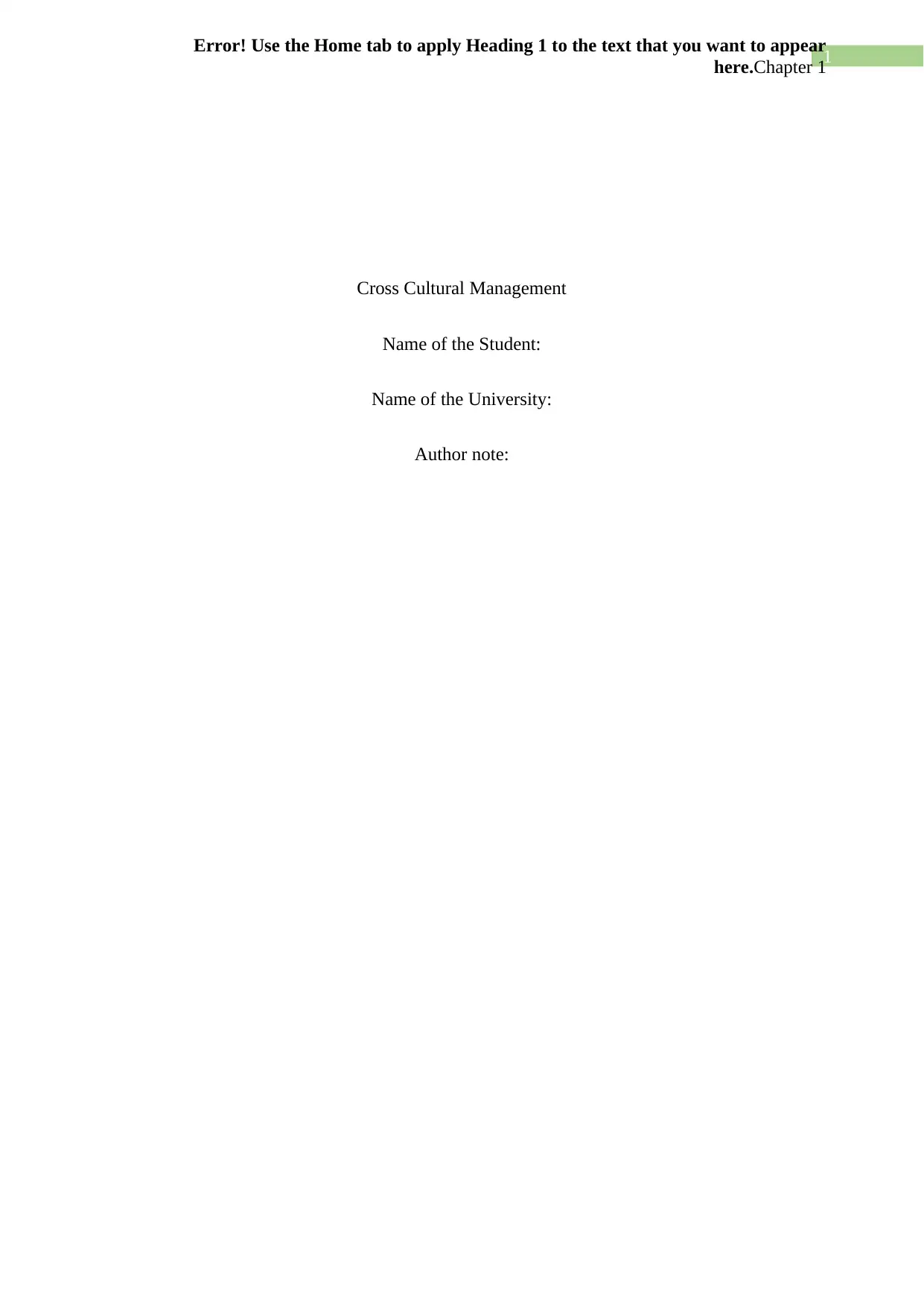
1
Error! Use the Home tab to apply Heading 1 to the text that you want to appear
here.Chapter 1
Cross Cultural Management
Name of the Student:
Name of the University:
Author note:
Error! Use the Home tab to apply Heading 1 to the text that you want to appear
here.Chapter 1
Cross Cultural Management
Name of the Student:
Name of the University:
Author note:
Paraphrase This Document
Need a fresh take? Get an instant paraphrase of this document with our AI Paraphraser
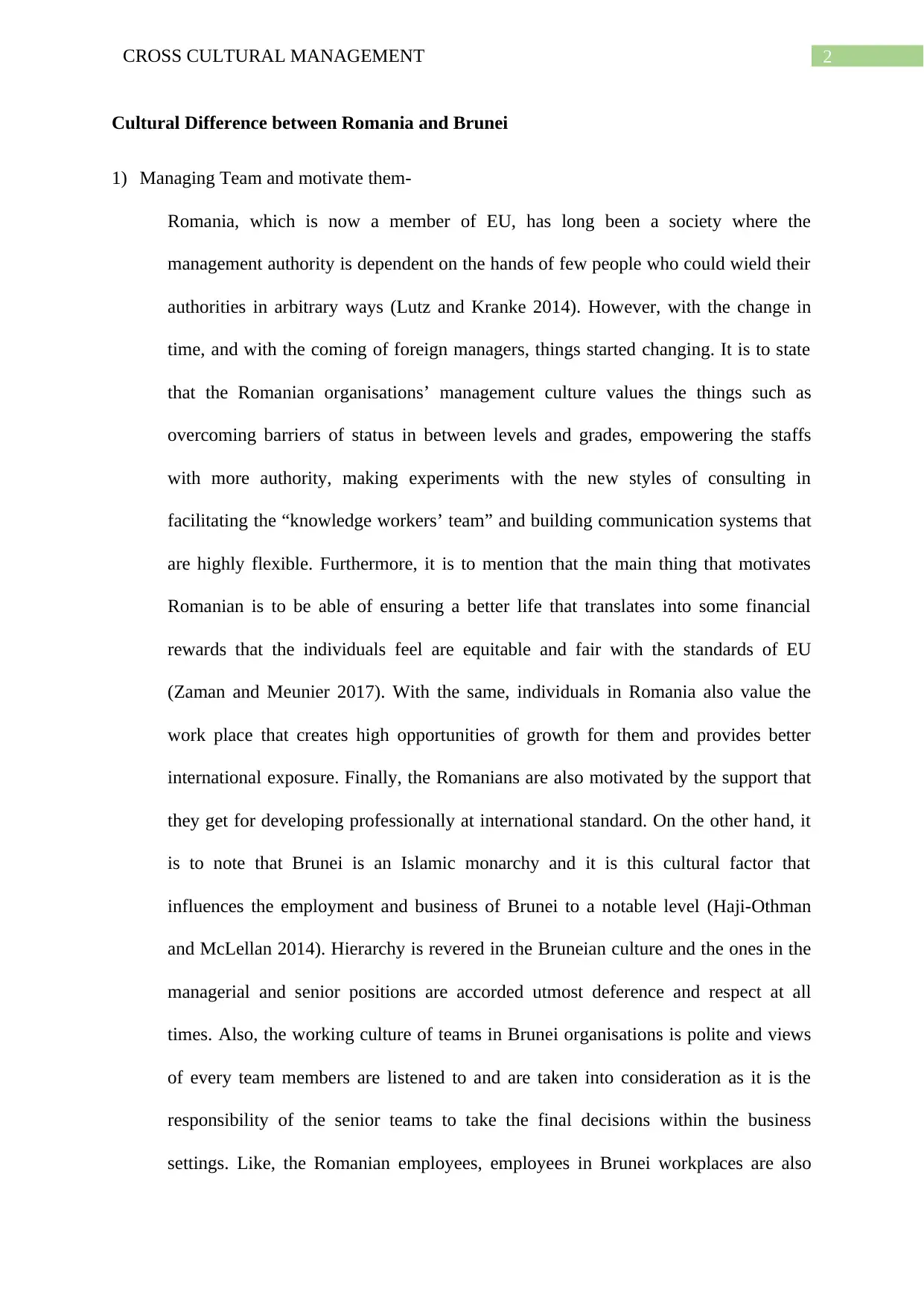
2CROSS CULTURAL MANAGEMENT
Cultural Difference between Romania and Brunei
1) Managing Team and motivate them-
Romania, which is now a member of EU, has long been a society where the
management authority is dependent on the hands of few people who could wield their
authorities in arbitrary ways (Lutz and Kranke 2014). However, with the change in
time, and with the coming of foreign managers, things started changing. It is to state
that the Romanian organisations’ management culture values the things such as
overcoming barriers of status in between levels and grades, empowering the staffs
with more authority, making experiments with the new styles of consulting in
facilitating the “knowledge workers’ team” and building communication systems that
are highly flexible. Furthermore, it is to mention that the main thing that motivates
Romanian is to be able of ensuring a better life that translates into some financial
rewards that the individuals feel are equitable and fair with the standards of EU
(Zaman and Meunier 2017). With the same, individuals in Romania also value the
work place that creates high opportunities of growth for them and provides better
international exposure. Finally, the Romanians are also motivated by the support that
they get for developing professionally at international standard. On the other hand, it
is to note that Brunei is an Islamic monarchy and it is this cultural factor that
influences the employment and business of Brunei to a notable level (Haji-Othman
and McLellan 2014). Hierarchy is revered in the Bruneian culture and the ones in the
managerial and senior positions are accorded utmost deference and respect at all
times. Also, the working culture of teams in Brunei organisations is polite and views
of every team members are listened to and are taken into consideration as it is the
responsibility of the senior teams to take the final decisions within the business
settings. Like, the Romanian employees, employees in Brunei workplaces are also
Cultural Difference between Romania and Brunei
1) Managing Team and motivate them-
Romania, which is now a member of EU, has long been a society where the
management authority is dependent on the hands of few people who could wield their
authorities in arbitrary ways (Lutz and Kranke 2014). However, with the change in
time, and with the coming of foreign managers, things started changing. It is to state
that the Romanian organisations’ management culture values the things such as
overcoming barriers of status in between levels and grades, empowering the staffs
with more authority, making experiments with the new styles of consulting in
facilitating the “knowledge workers’ team” and building communication systems that
are highly flexible. Furthermore, it is to mention that the main thing that motivates
Romanian is to be able of ensuring a better life that translates into some financial
rewards that the individuals feel are equitable and fair with the standards of EU
(Zaman and Meunier 2017). With the same, individuals in Romania also value the
work place that creates high opportunities of growth for them and provides better
international exposure. Finally, the Romanians are also motivated by the support that
they get for developing professionally at international standard. On the other hand, it
is to note that Brunei is an Islamic monarchy and it is this cultural factor that
influences the employment and business of Brunei to a notable level (Haji-Othman
and McLellan 2014). Hierarchy is revered in the Bruneian culture and the ones in the
managerial and senior positions are accorded utmost deference and respect at all
times. Also, the working culture of teams in Brunei organisations is polite and views
of every team members are listened to and are taken into consideration as it is the
responsibility of the senior teams to take the final decisions within the business
settings. Like, the Romanian employees, employees in Brunei workplaces are also
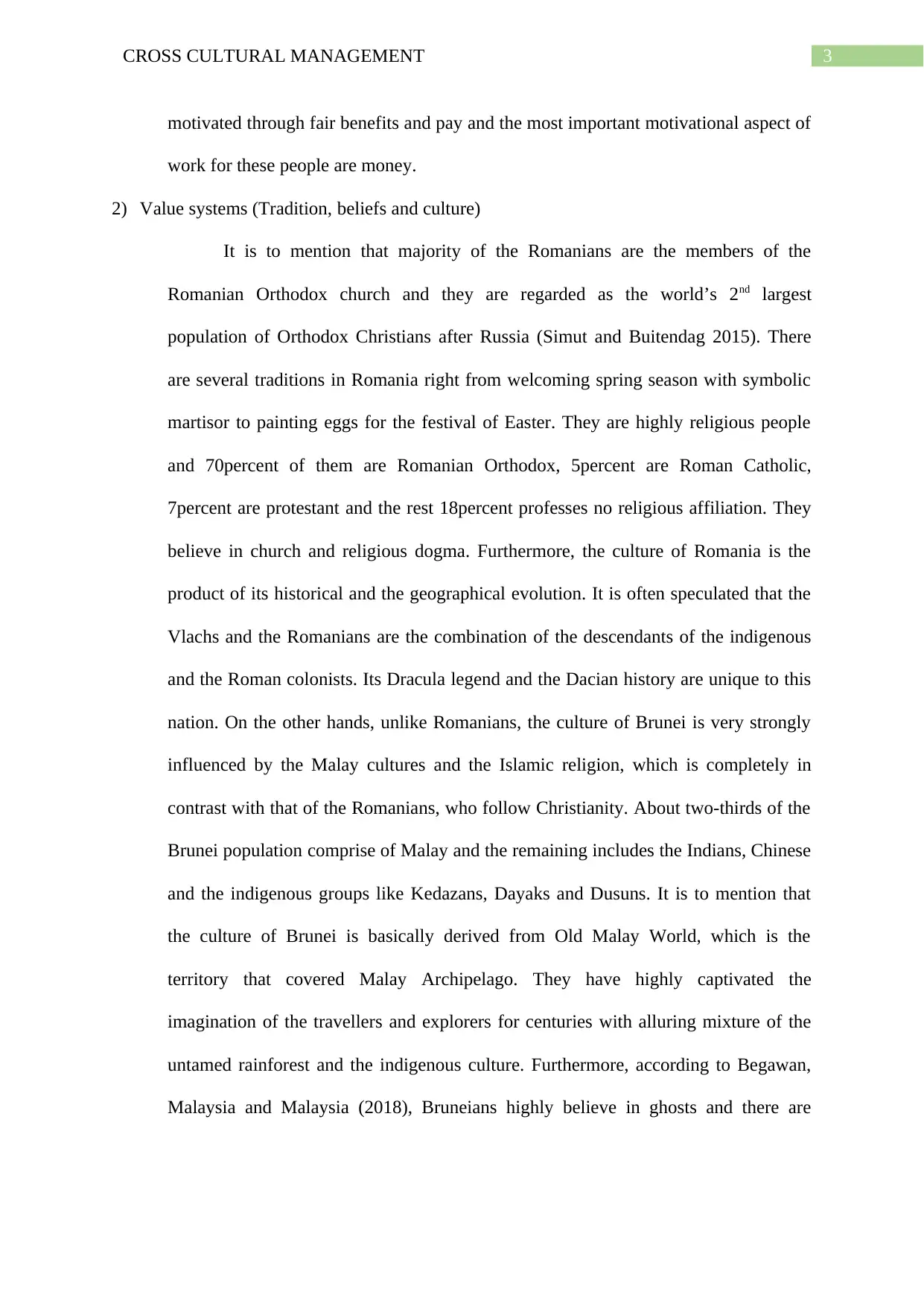
3CROSS CULTURAL MANAGEMENT
motivated through fair benefits and pay and the most important motivational aspect of
work for these people are money.
2) Value systems (Tradition, beliefs and culture)
It is to mention that majority of the Romanians are the members of the
Romanian Orthodox church and they are regarded as the world’s 2nd largest
population of Orthodox Christians after Russia (Simut and Buitendag 2015). There
are several traditions in Romania right from welcoming spring season with symbolic
martisor to painting eggs for the festival of Easter. They are highly religious people
and 70percent of them are Romanian Orthodox, 5percent are Roman Catholic,
7percent are protestant and the rest 18percent professes no religious affiliation. They
believe in church and religious dogma. Furthermore, the culture of Romania is the
product of its historical and the geographical evolution. It is often speculated that the
Vlachs and the Romanians are the combination of the descendants of the indigenous
and the Roman colonists. Its Dracula legend and the Dacian history are unique to this
nation. On the other hands, unlike Romanians, the culture of Brunei is very strongly
influenced by the Malay cultures and the Islamic religion, which is completely in
contrast with that of the Romanians, who follow Christianity. About two-thirds of the
Brunei population comprise of Malay and the remaining includes the Indians, Chinese
and the indigenous groups like Kedazans, Dayaks and Dusuns. It is to mention that
the culture of Brunei is basically derived from Old Malay World, which is the
territory that covered Malay Archipelago. They have highly captivated the
imagination of the travellers and explorers for centuries with alluring mixture of the
untamed rainforest and the indigenous culture. Furthermore, according to Begawan,
Malaysia and Malaysia (2018), Bruneians highly believe in ghosts and there are
motivated through fair benefits and pay and the most important motivational aspect of
work for these people are money.
2) Value systems (Tradition, beliefs and culture)
It is to mention that majority of the Romanians are the members of the
Romanian Orthodox church and they are regarded as the world’s 2nd largest
population of Orthodox Christians after Russia (Simut and Buitendag 2015). There
are several traditions in Romania right from welcoming spring season with symbolic
martisor to painting eggs for the festival of Easter. They are highly religious people
and 70percent of them are Romanian Orthodox, 5percent are Roman Catholic,
7percent are protestant and the rest 18percent professes no religious affiliation. They
believe in church and religious dogma. Furthermore, the culture of Romania is the
product of its historical and the geographical evolution. It is often speculated that the
Vlachs and the Romanians are the combination of the descendants of the indigenous
and the Roman colonists. Its Dracula legend and the Dacian history are unique to this
nation. On the other hands, unlike Romanians, the culture of Brunei is very strongly
influenced by the Malay cultures and the Islamic religion, which is completely in
contrast with that of the Romanians, who follow Christianity. About two-thirds of the
Brunei population comprise of Malay and the remaining includes the Indians, Chinese
and the indigenous groups like Kedazans, Dayaks and Dusuns. It is to mention that
the culture of Brunei is basically derived from Old Malay World, which is the
territory that covered Malay Archipelago. They have highly captivated the
imagination of the travellers and explorers for centuries with alluring mixture of the
untamed rainforest and the indigenous culture. Furthermore, according to Begawan,
Malaysia and Malaysia (2018), Bruneians highly believe in ghosts and there are
⊘ This is a preview!⊘
Do you want full access?
Subscribe today to unlock all pages.

Trusted by 1+ million students worldwide
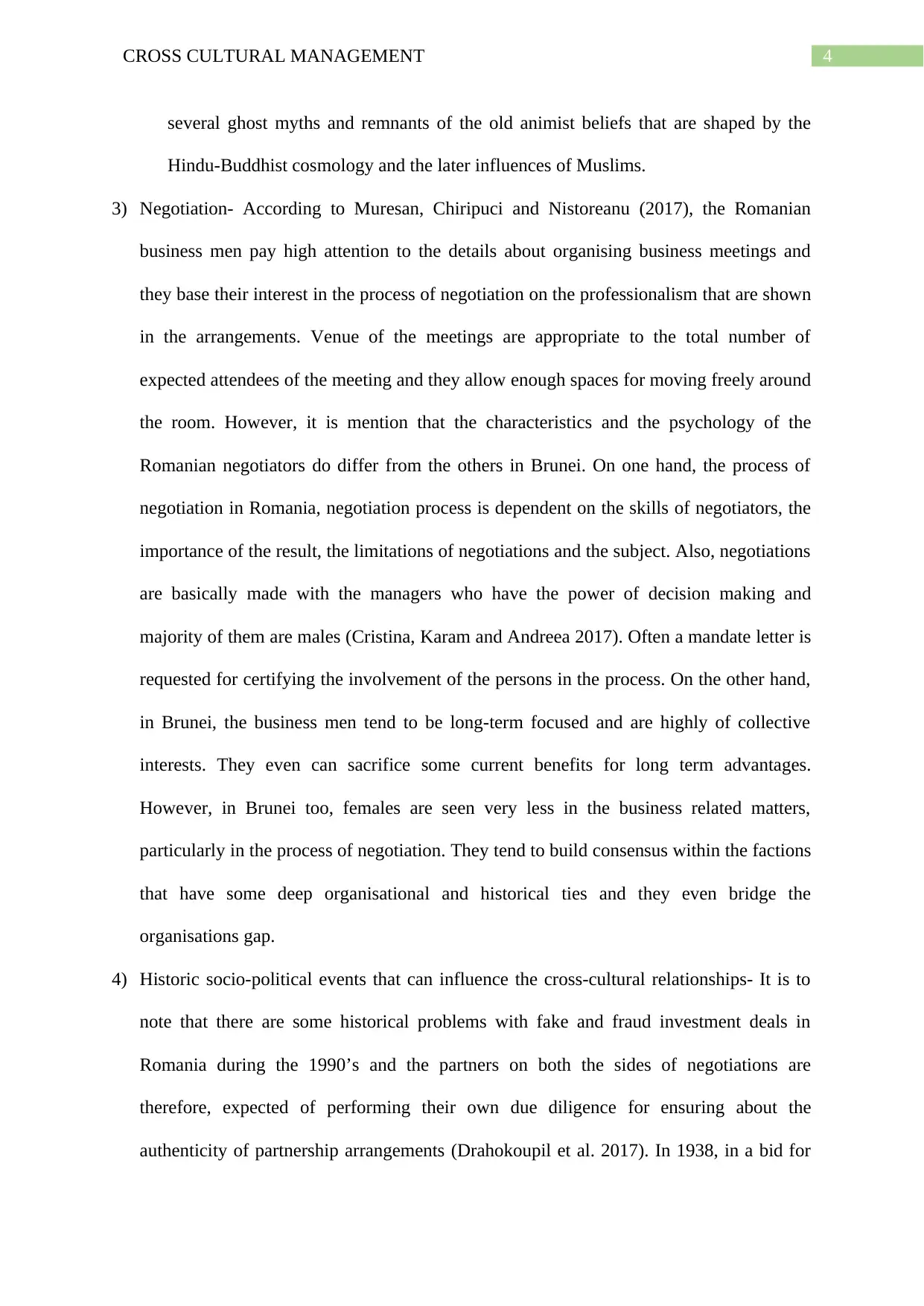
4CROSS CULTURAL MANAGEMENT
several ghost myths and remnants of the old animist beliefs that are shaped by the
Hindu-Buddhist cosmology and the later influences of Muslims.
3) Negotiation- According to Muresan, Chiripuci and Nistoreanu (2017), the Romanian
business men pay high attention to the details about organising business meetings and
they base their interest in the process of negotiation on the professionalism that are shown
in the arrangements. Venue of the meetings are appropriate to the total number of
expected attendees of the meeting and they allow enough spaces for moving freely around
the room. However, it is mention that the characteristics and the psychology of the
Romanian negotiators do differ from the others in Brunei. On one hand, the process of
negotiation in Romania, negotiation process is dependent on the skills of negotiators, the
importance of the result, the limitations of negotiations and the subject. Also, negotiations
are basically made with the managers who have the power of decision making and
majority of them are males (Cristina, Karam and Andreea 2017). Often a mandate letter is
requested for certifying the involvement of the persons in the process. On the other hand,
in Brunei, the business men tend to be long-term focused and are highly of collective
interests. They even can sacrifice some current benefits for long term advantages.
However, in Brunei too, females are seen very less in the business related matters,
particularly in the process of negotiation. They tend to build consensus within the factions
that have some deep organisational and historical ties and they even bridge the
organisations gap.
4) Historic socio-political events that can influence the cross-cultural relationships- It is to
note that there are some historical problems with fake and fraud investment deals in
Romania during the 1990’s and the partners on both the sides of negotiations are
therefore, expected of performing their own due diligence for ensuring about the
authenticity of partnership arrangements (Drahokoupil et al. 2017). In 1938, in a bid for
several ghost myths and remnants of the old animist beliefs that are shaped by the
Hindu-Buddhist cosmology and the later influences of Muslims.
3) Negotiation- According to Muresan, Chiripuci and Nistoreanu (2017), the Romanian
business men pay high attention to the details about organising business meetings and
they base their interest in the process of negotiation on the professionalism that are shown
in the arrangements. Venue of the meetings are appropriate to the total number of
expected attendees of the meeting and they allow enough spaces for moving freely around
the room. However, it is mention that the characteristics and the psychology of the
Romanian negotiators do differ from the others in Brunei. On one hand, the process of
negotiation in Romania, negotiation process is dependent on the skills of negotiators, the
importance of the result, the limitations of negotiations and the subject. Also, negotiations
are basically made with the managers who have the power of decision making and
majority of them are males (Cristina, Karam and Andreea 2017). Often a mandate letter is
requested for certifying the involvement of the persons in the process. On the other hand,
in Brunei, the business men tend to be long-term focused and are highly of collective
interests. They even can sacrifice some current benefits for long term advantages.
However, in Brunei too, females are seen very less in the business related matters,
particularly in the process of negotiation. They tend to build consensus within the factions
that have some deep organisational and historical ties and they even bridge the
organisations gap.
4) Historic socio-political events that can influence the cross-cultural relationships- It is to
note that there are some historical problems with fake and fraud investment deals in
Romania during the 1990’s and the partners on both the sides of negotiations are
therefore, expected of performing their own due diligence for ensuring about the
authenticity of partnership arrangements (Drahokoupil et al. 2017). In 1938, in a bid for
Paraphrase This Document
Need a fresh take? Get an instant paraphrase of this document with our AI Paraphraser
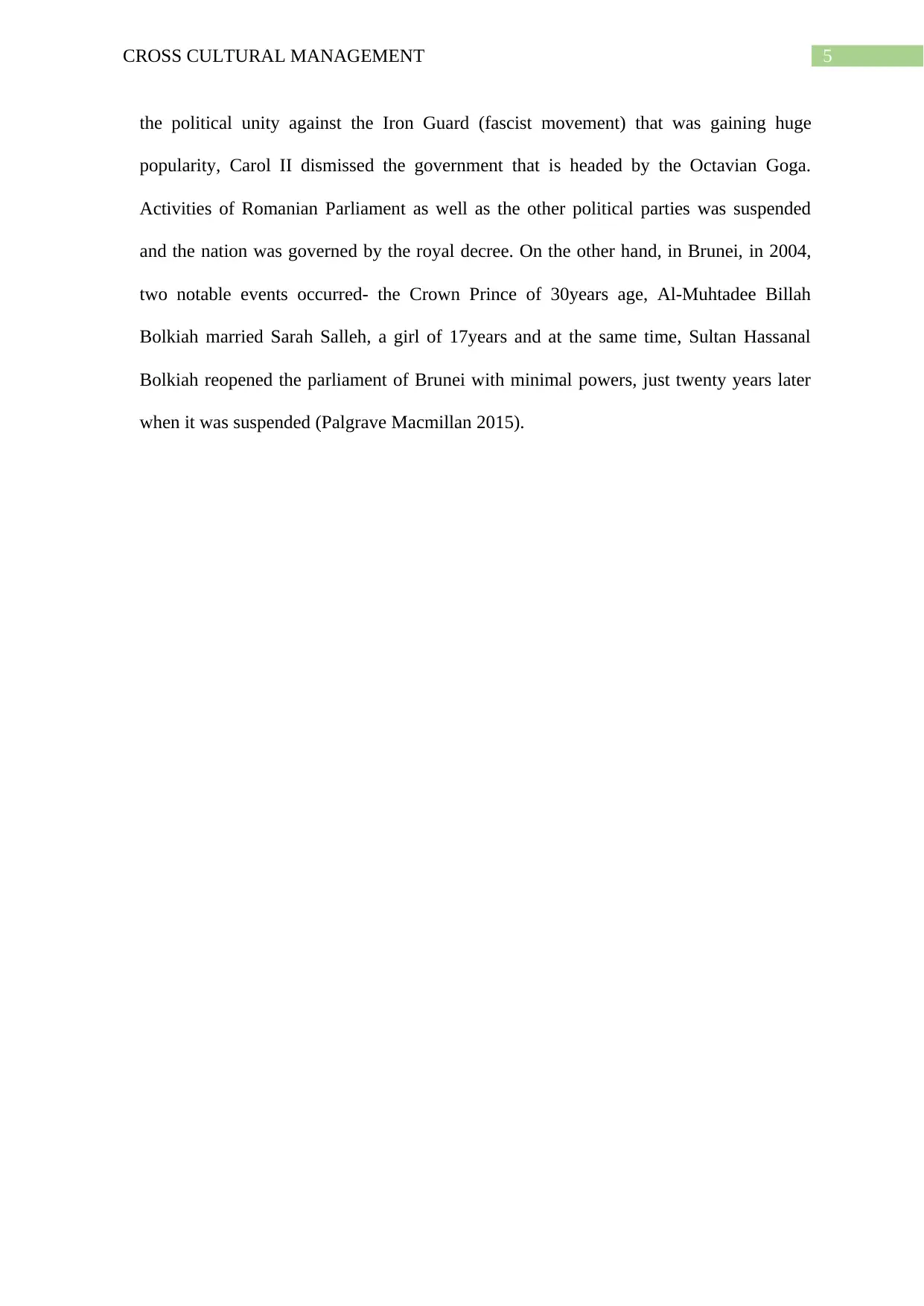
5CROSS CULTURAL MANAGEMENT
the political unity against the Iron Guard (fascist movement) that was gaining huge
popularity, Carol II dismissed the government that is headed by the Octavian Goga.
Activities of Romanian Parliament as well as the other political parties was suspended
and the nation was governed by the royal decree. On the other hand, in Brunei, in 2004,
two notable events occurred- the Crown Prince of 30years age, Al-Muhtadee Billah
Bolkiah married Sarah Salleh, a girl of 17years and at the same time, Sultan Hassanal
Bolkiah reopened the parliament of Brunei with minimal powers, just twenty years later
when it was suspended (Palgrave Macmillan 2015).
the political unity against the Iron Guard (fascist movement) that was gaining huge
popularity, Carol II dismissed the government that is headed by the Octavian Goga.
Activities of Romanian Parliament as well as the other political parties was suspended
and the nation was governed by the royal decree. On the other hand, in Brunei, in 2004,
two notable events occurred- the Crown Prince of 30years age, Al-Muhtadee Billah
Bolkiah married Sarah Salleh, a girl of 17years and at the same time, Sultan Hassanal
Bolkiah reopened the parliament of Brunei with minimal powers, just twenty years later
when it was suspended (Palgrave Macmillan 2015).
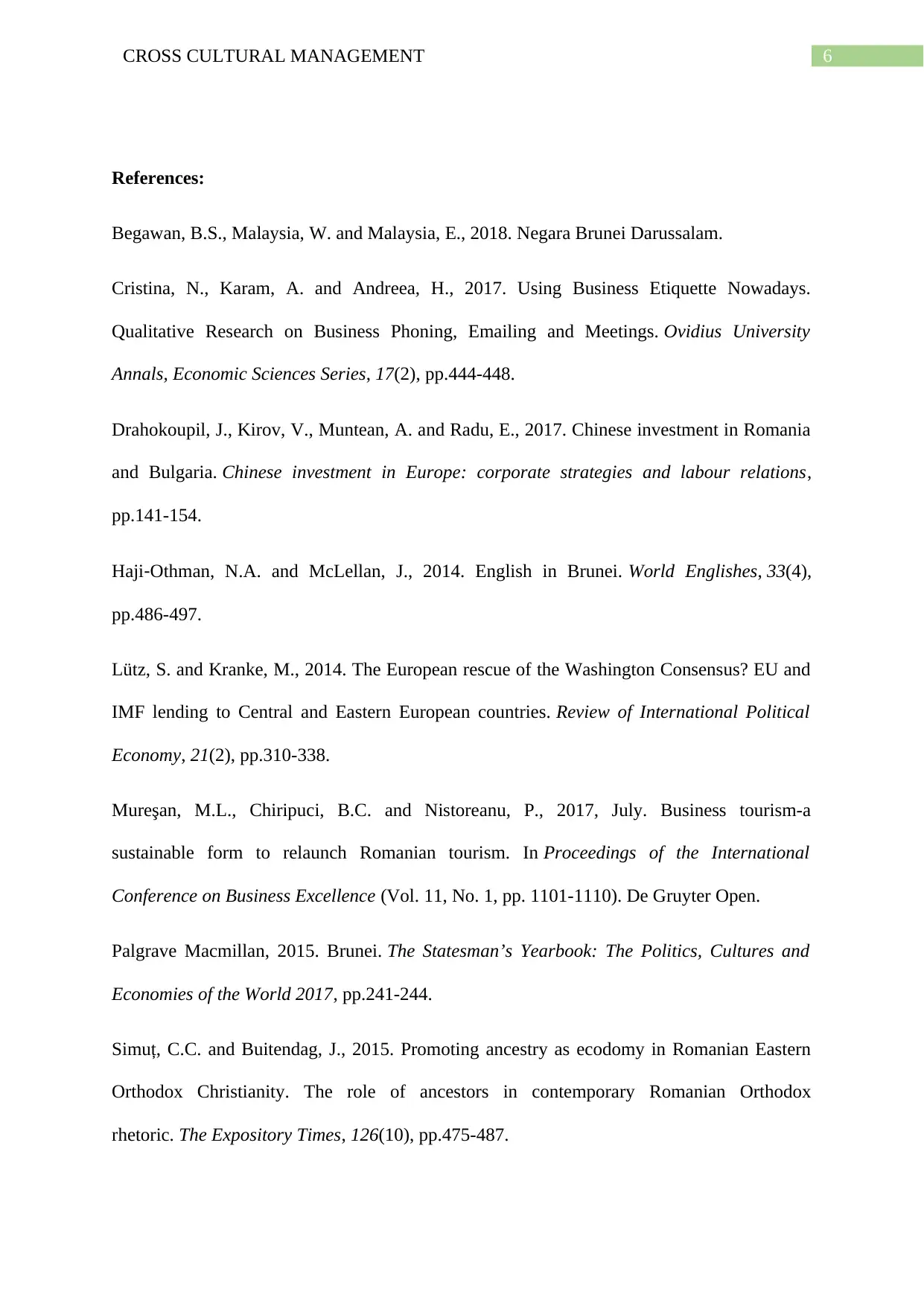
6CROSS CULTURAL MANAGEMENT
References:
Begawan, B.S., Malaysia, W. and Malaysia, E., 2018. Negara Brunei Darussalam.
Cristina, N., Karam, A. and Andreea, H., 2017. Using Business Etiquette Nowadays.
Qualitative Research on Business Phoning, Emailing and Meetings. Ovidius University
Annals, Economic Sciences Series, 17(2), pp.444-448.
Drahokoupil, J., Kirov, V., Muntean, A. and Radu, E., 2017. Chinese investment in Romania
and Bulgaria. Chinese investment in Europe: corporate strategies and labour relations,
pp.141-154.
Haji‐Othman, N.A. and McLellan, J., 2014. English in Brunei. World Englishes, 33(4),
pp.486-497.
Lütz, S. and Kranke, M., 2014. The European rescue of the Washington Consensus? EU and
IMF lending to Central and Eastern European countries. Review of International Political
Economy, 21(2), pp.310-338.
Mureşan, M.L., Chiripuci, B.C. and Nistoreanu, P., 2017, July. Business tourism-a
sustainable form to relaunch Romanian tourism. In Proceedings of the International
Conference on Business Excellence (Vol. 11, No. 1, pp. 1101-1110). De Gruyter Open.
Palgrave Macmillan, 2015. Brunei. The Statesman’s Yearbook: The Politics, Cultures and
Economies of the World 2017, pp.241-244.
Simuț, C.C. and Buitendag, J., 2015. Promoting ancestry as ecodomy in Romanian Eastern
Orthodox Christianity. The role of ancestors in contemporary Romanian Orthodox
rhetoric. The Expository Times, 126(10), pp.475-487.
References:
Begawan, B.S., Malaysia, W. and Malaysia, E., 2018. Negara Brunei Darussalam.
Cristina, N., Karam, A. and Andreea, H., 2017. Using Business Etiquette Nowadays.
Qualitative Research on Business Phoning, Emailing and Meetings. Ovidius University
Annals, Economic Sciences Series, 17(2), pp.444-448.
Drahokoupil, J., Kirov, V., Muntean, A. and Radu, E., 2017. Chinese investment in Romania
and Bulgaria. Chinese investment in Europe: corporate strategies and labour relations,
pp.141-154.
Haji‐Othman, N.A. and McLellan, J., 2014. English in Brunei. World Englishes, 33(4),
pp.486-497.
Lütz, S. and Kranke, M., 2014. The European rescue of the Washington Consensus? EU and
IMF lending to Central and Eastern European countries. Review of International Political
Economy, 21(2), pp.310-338.
Mureşan, M.L., Chiripuci, B.C. and Nistoreanu, P., 2017, July. Business tourism-a
sustainable form to relaunch Romanian tourism. In Proceedings of the International
Conference on Business Excellence (Vol. 11, No. 1, pp. 1101-1110). De Gruyter Open.
Palgrave Macmillan, 2015. Brunei. The Statesman’s Yearbook: The Politics, Cultures and
Economies of the World 2017, pp.241-244.
Simuț, C.C. and Buitendag, J., 2015. Promoting ancestry as ecodomy in Romanian Eastern
Orthodox Christianity. The role of ancestors in contemporary Romanian Orthodox
rhetoric. The Expository Times, 126(10), pp.475-487.
⊘ This is a preview!⊘
Do you want full access?
Subscribe today to unlock all pages.

Trusted by 1+ million students worldwide
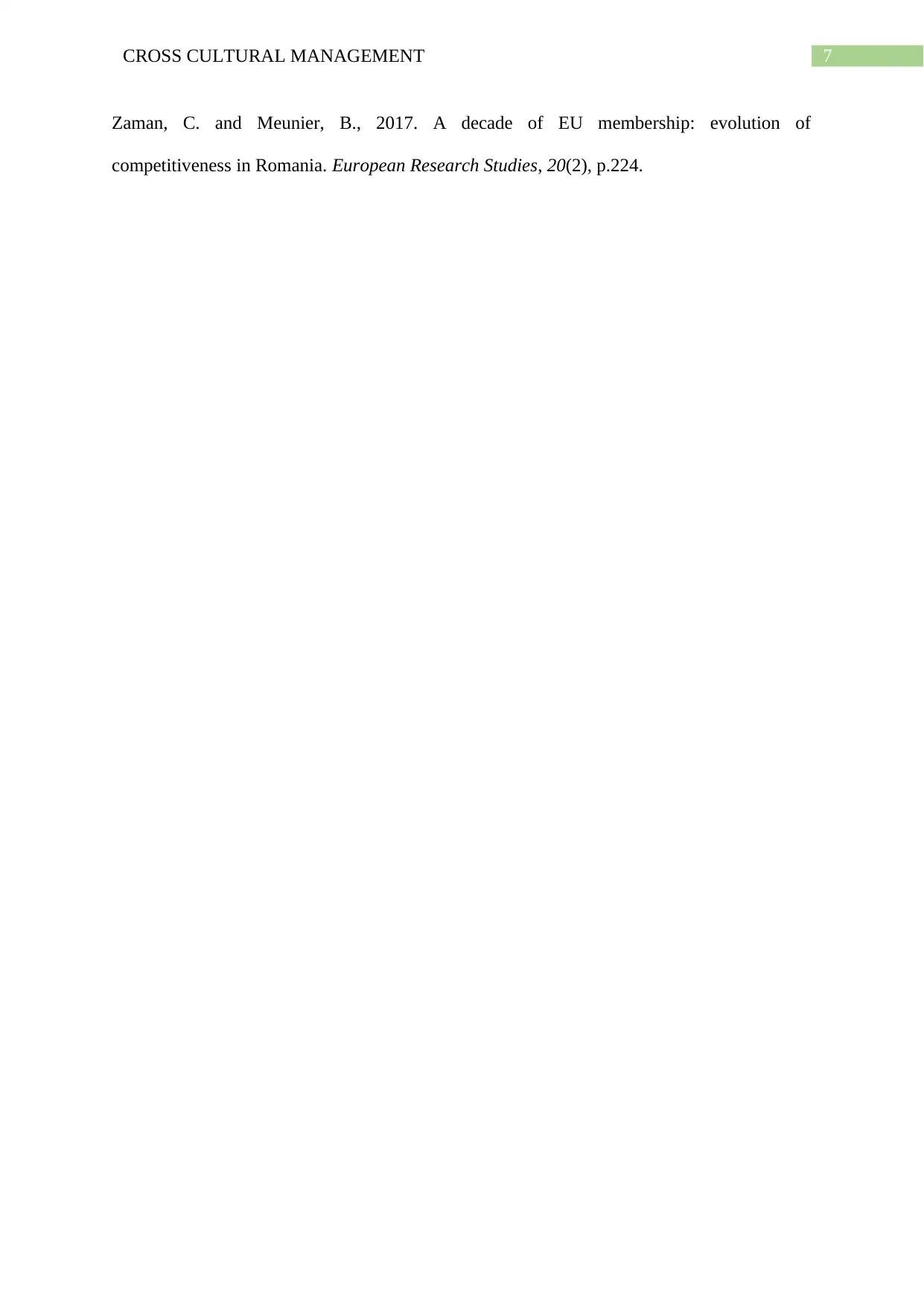
7CROSS CULTURAL MANAGEMENT
Zaman, C. and Meunier, B., 2017. A decade of EU membership: evolution of
competitiveness in Romania. European Research Studies, 20(2), p.224.
Zaman, C. and Meunier, B., 2017. A decade of EU membership: evolution of
competitiveness in Romania. European Research Studies, 20(2), p.224.
1 out of 7
Your All-in-One AI-Powered Toolkit for Academic Success.
+13062052269
info@desklib.com
Available 24*7 on WhatsApp / Email
![[object Object]](/_next/static/media/star-bottom.7253800d.svg)
Unlock your academic potential
Copyright © 2020–2026 A2Z Services. All Rights Reserved. Developed and managed by ZUCOL.
